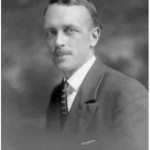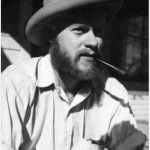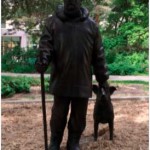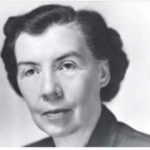Angus McGill Mowat

Angus Mowat was born on November 19, 1892 in Trenton, Ontario. He received a Bachelor of Arts Honours degree from Queen’s University. In 1914, he joined the Queen’s University Corps as a Private. He went abroad with the Canadian Expeditionary Force and is said to have fought in the battle at Vimy Ridge.
While recovering from the army, Angus began his career as a librarian. In 1926, he took a course from the University of Toronto Library School. He was Chief Librarian in three Ontario centres: Trenton from 1922 to 1928, Belleville from 1928 until 1930, and Windsor from 1930 until 1932. While in Belville, Angus set up the first public library on a First Nations reserve in Canada. In 1932, Angus accepted a librarian position at the Saskatoon Public Library. Angus was the first professionally trained librarian at the Saskatoon Public Library.
Continuing his education, Angus received a Master’s degree in English from the University of Saskatchewan in 1935. He also managed to find time to write occasional articles for the Star Phoenix, and was an accomplished author who published several books throughout his lifetime.
One of Angus’ greatest accomplishments was the Rural Book Distribution Scheme, which brought books to isolated drought stricken communities. In 1937, Angus left Saskatoon to become the Inspector of Public Libraries for the Ontario Department of Education. From 1940 until 1944, he was again a part of the Armed Forces. One of his jobs was to get books to soldiers in Europe. In 1951, he became a sessional lecturer at McGill Library School. He retired in 1960. Angus passed away on September 21, 1977 in Kingston, Ontario.
In 1985, the Angus Mowat Award of Excellence was named after him. It recognizes outstanding delivery of public library services and is given annually to a library in Ontario.
While in Saskatoon, the Mowats originally lived at 908 Saskatchewan Crescent East, but the home was recently renovated and relocated to 1004 15th Street East in Varsity View.
This information was collected from the following sources:
– Millar, R. (2013). Turning Back the Pages: 100 Years at the Saskatoon Public Library.
Regina: Coteau Books.
– University of Guelph (1996). Angus McGill Mowat, 1892-1977. Retrieved from http://www.uoguelph.ca/~lbruce/photos/Mowatam.html
Farley Mowat

Farley Mowat was a renowned author, activist, and environmentalist. He was born in 1921 in Belleville, Ontario and moved to Saskatoon with his family in 1932. As a boy, Farley was fascinated by nature and was known to keep a museum in his basement, which included the joined skull of a two-headed calf, some stuffed birds, and a bear cub. In 1934, Farley founded the newspaper Nature Lore. He also wrote a weekly column in the Star Phoenix about birds in Saskatoon.
At the beginning of the Second World War, Farley entered into officer training and was sent overseas to England. It is these wartime experiences that would prompt him to write The Dog Who Wouldn’t Be (1957). His war experiences also provided material for some of his other books including The Regiment (1954) and No Birds Sing (1979). In 1946, Farley was discharged from the army and enrolled at the University of Toronto, where he received a Bachelor of Arts degree in 1949.
Aside from being an author, Farley was also an environmentalist. In the summer of 1947, he accepted a job as a government biologist in the Northwest Territories where he observed the extent to which wolves were responsible for the disappearing caribou population. It is this experience with wolves that would lead to the idea behind one of his most popular works, Never Cry Wolf (1963).
Farley published his first book, entitled People of the Deer, in 1952 and his first children’s book, Lost in the Barrens, was published in 1956.
Farley received many honours for his contributions to Canada including the Governor General Award in 1956, the Queen Elizabeth Jubilee Medal in 1978, and was made an Officer of the Order of Canada in 1981. He published his last book in 2010 and was also inducted in Canada’s Walk of Fame. Farley passed away on May 6, 2014.
The Mowat family home was originally located at 908 Saskatchewan Crescent, which was recently renovated and relocated to 1004 15th Street East in Varsity View.
Farley Mowat Statue

Farley Mowat Statue at the University of Saskatchewan[/caption]A statue of Farley Mowat was unveiled at the University of Saskatchewan on June 11, 2014. The statue is of Farley and his dog, Chester, and is located among a group of trees between the Murray Library and the Arts Building at the University of Saskatchewan. Originally, the memorial only consisted of a statue of Farley. However, halfway through the project, Chester passed away and the Mowat’s also wanted him immortalized. The statue took four years to create and consisted of 600 pounds of clay, covered with a fiberglass shell and painted with wax on the inside. Toronto businessman Ron Rhodes commissioned the statue.
For more information on the unveiling of the Farley Mowat statue, please visit the following link: http://www.thestarphoenix.com/entertainment/Statue+legacy+Mowat+love+nature/9929027/story.html
This information was collected from the following sources:
– Charlton, J. (2014). Statue a legacy to Mowat’s love of nature. The StarPhoenix.
Retrieved from http://www.thestarphoenix.com/entertainment/Statue+legacy+Mowat+love+nature/9929027/story.html
– Lange, A. (2014). Farley Mowat: a timeline of his life. Toronto Star. Retrieved from
http://www.thestar.com/entertainment/books/2014/05/07/farley_mowat_a_timelin
e_of_his_life.html
– Millar, R. (2013). Turning Back the Pages: 100 Years at the Saskatoon Public Library.
Regina: Coteau Books.
Leona Theis

Leona grew up in a small town in eastern Saskatchewan by the name of Bredenbury. The small town setting has influenced Leona throughout her career. Leona’s first book, titled Sightlines, was published in 2000 and is comprised of a series of interconnected stories. Her first story, which eventually appeared in Sightlines, describes the scenes of children lighting fires in Saskatchewan pastures and digging holes in the backyards of a
small prairie town. In 2000, Leona won the Saskatchewan Fiction Award and Saskatoon Book Award for Sightlines.
Aside from being influenced by small town life, Leona has had the opportunity to work with many other writers. She has worked with Sandra Birdsell, Dave Mergoshes, Guy Vanderhaeghe, Janice Kulyk Keefer, and Michael Winter. Leona took a fiction course at the University of Saskatchewan with Guy Vanderhaeghe as her professor. “He was successfully writing about this province,” says Leona. “Not many people were doing this when I was growing up.” Leona also draws inspiration from her favourite places to write, which include a cabin on the shore of Christopher Lake and Broadway Roastery in Saskatoon.
Leona has lived in Saskatoon since 1973. She has also resided in Vancouver, Denmark, Australia, and France. From the University of Saskatchewan, Leona has a Sociology degree as well as a Masters in Adult Education. Leona’s second book, The Art of Salvage, first appeared in 2006 and is partly set on Temperance Street. Leona has also written several short stories and personal essays. Her work has appeared in many literary journals across Canada and has also been broadcast on the CBC radio programs Between the Covers and Gallery. Her short story entitled The Stuff that Makes You Lift Cars was adapted into a short film by RGB Productions of Regina.
Leona’s work has won and been nominated for several awards. She won the CBC Literary Award for creative non-fiction in 2006. Her works have been shortlisted three additional times for this award. In 2011, her work “Unsupervised Swimming” was runner-up in the John Hicks long manuscript competition. Leona’s short fiction has also recently been nominated for the Exile/Vanderbilt Short Fiction Award and the Journey Prize.
Leona has attended the Sage Hill Writing Experience and is an alumna of the Banff Writing Studio. In 2013, Leona was a writer-in-residence for the Mackie Lake House Writer-in-Residence Program in Vernon, British Columbia. Leona has worked at the University of Saskatchewan as a mentor, editor of academic journals, librarian, and researcher. Her works are available at McNally Robinson, Coteau Books, or through online bookstores. She is currently working on a novel set in Saskatoon and Vancouver.
Leona currently resides in the Varsity View neighbourhood.
If you would like to know more about Leona, please visit the following link:
http://leonatheis.com
This information was gathered from the following sources:
– Canadian Books and Authors (2005-2014). Saskatchewan Book Awards: Saskatoon Book Award. Retrieved from http://www.canadianauthors.net/awards/saskatchewan_book_awards/saskatoon/
– Kalamalka Press (n.d.). Writer in Residence for Autumn 2013: September 2013- Leona
Theis. Retrieved from http://www.kalamalkapress.com/mackie-series/mackie-residency.html
– Leona Theis (n.d.). About the Author. Retrieved from http://leonatheis.com
Robert Lorin Calder

Robert Lorin Calder was born on April 3, 1941 in Moose Jaw, Saskatchewan. From the University of Saskatchewan, Robert received a Bachelor of Arts, Honours in English Literature in 1964. He earned his Masters degree in 1965 from the University of Saskatchewan. From the University of Leeds in England, Robert earned a Doctorate degree in English in 1970. He then returned to the University of Saskatchewan to become a professor of English and a specialist in 20th century British fiction and drama.
Robert is an internationally known scholar specializing in British literature and is considered the world’s leading authority on author Somerset Maugham. He has written two books on the author, entitled W. Somerset Maugham and the Quest for Freedom (1972) and Willie: The Life of W. Somerset Maugham (1989). The latter work earned Robert the Governor General’s Literary Award for Non-Fiction.
Robert is also well known for his background in British and Canadian wartime literature. He has written books on the social impacts of World War II, including A Richer Dust: Family, Memory, and the Second World War (2004) and Beware the British Serpent: The Role of British Propaganda in the United States: 1939-1945 (2004). The first work is a family memoir that won the John V. Hicks Manuscript Award for excellence in literary non-fiction in 2003. The second work details the role of British writers in World War II propaganda and won two Saskatchewan Book Awards. Robert co-authored the book Rider Pride: The Story of Canada’s Best-Loved Football Team (1984). Robert also co-edited the anthology Time as a Human Resource (1991), which is a work focusing on the subject of time.
Along with being an author, Robert has also had a distinguished academic career. He chaired the English Department at the University of Saskatchewan from 1979 until 1981. He was Associate Dean of Humanities from 1981 until 1984. From 1988 until 1989, he was the Acting Head of the Department of Music. In 2005, he received the Distinguished Researcher Award from the University of Saskatchewan. The award is presented to a faculty member who has contributed to scholarship through creation, expansion, and critique of knowledge.
Robert formerly resided at 1202 Elliott Street.
This information was gathered from the following resources:
– Henderson’s Saskatoon Directory, 1965.
– Stewart, I. (n.d.). Calder, Robert (1941-). In The Encyclopedia of Saskatchewan.
Retrieved from http://esask.uregina.ca/entry/calder_robert_l_1941-.html
– University of Saskatchewan (2005). Robert Calder. In Awards and Prizes. Retrieved from
http://awards.usask.ca/faculty/recipients/calder.php
Hilda Neatby

Hilda Neatby was born in Surrey, England in 1904. Along with her parents and siblings, she moved to Saskatchewan in 1906. In 1924, Hilda received a Bachelor of Arts Honours in History from the University of Saskatchewan. She then studied and taught at the University of Saskatchewan for the next ten years. In 1934, she received a PhD in History from the University of Minnesota. After graduating, she taught history and french at Regina College until 1946, at which time she began teaching history at the University of Saskatchewan.
Between 1949 and 1951, Hilda was a member of the Royal Commission on National Development in the Arts, Letters, and Sciences (better known as the Massey Commission). Her experiences on the Commission left her with strong feelings towards Canadian education and helped to form the ideas behind her 1953 book entitled So Little Mind. The book critiqued Canadian education and sparked a national debate. It was this work that made Hilda “one of the most formidable and independent intellectuals in Canada”. In 1954, she published a sequel entitled Temperate Dispute.
In 1958, Hilda became Head of the History of Department and fulfilled this position until 1969. She was the first woman to head a department at a Canadian university. Hilda was also the first president of the Canadian Historical Association. She then accepted a position at Queen’s University as a professor of history. In 1967, she became a Companion of the Order of Canada. At one time, Hilda and her colleague Mabel Timlin were the only women Fellows of the Royal Society of Canada in the English language Humanities and Social Sciences section. Hilda was the recipient of Honourary degrees from 6 universities, including the University of Saskatchewan. Hilda passed away on May 14, 1975.
Although Hilda was best known for her 1953 work So Little Mind, she also published several other books. These include Quebec, The Revolutionary Age 1760-1791 (1966) and The Quebec Act: Protest and Policy (1972), both outlining the history of Quebec. In 1978, Hilda also wrote a history on Queen’s University entitled Queen’s University Volume 1- 1841-1917 and Not to Yield (1978). Along with these histories, Hilda also published two collections of speeches on education. In 1983, a collection of Hilda’s published and unpublished articles, speeches, and letters were compiled in the work entitled So Much to Do, So Little Time: The Writings of Hilda Neatby.
The Hilda Neatby prize is given out by the Canadian Historical Association and recognizes the best articles in French and English that contribute to the field of women’s history. In 2000, Hilda was commemorated in Canada Post’s Millennium Collection of stamps. The Neatby-Timilin lecture hall at the University of Saskatchewan is named in Hilda’s honour. Neatby Crescent and Place in Parkridge are named also named after her. The Hilda Neatby Memorial Scholarship at the University of Saskatchewan is given out annually to the top student entering a third year honours program in History, French, Humanities, and Fine Arts.
Hilda formerly resided at 1121 12th Street East.
This information was gathered from the following sources:
– Canadian Historical Association (n.d.). The Hilda Neatby Prize- English Article. In CHA
Prizes. Retrieved from http://www.cha-shc.ca/?lid=W7PT8-AJNXP-S6F9Q#sthash.VAGcJssj.dpbs
– College of Arts and Science (n.d.). Hilda Neatby (1904-1975). In College of Arts and
Science Centennial Scrapbook. Retrieved from http://www.arts.usask.ca/centennial/scrapbook/neatby.php
– Hayden, M. (n.d.). Neatby, Hilda (1904-75). In The Encyclopedia of Saskatchewan.
Retrieved from http://esask.uregina.ca/entry/neatby_hilda_1904-75.html
– Henderson’s Saskatoon Directory, 1930.
– University of Saskatchewan (2014). Hilda Neatby Memorial Scholarship. In University of
Saskatchewan Department of History. Retrieved from http://www.arts.usask.ca/history/give/
– University of Saskatchewan (n.d.). 1953: Hilda Neatby’s So Little Mind published. In
Events in the History of the University of Saskatchewan. Retrieved from
http://scaa.usask.ca/gallery/uofs_events/articles/1953.php